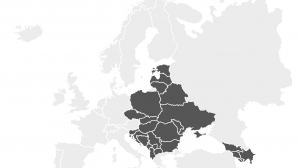The fight against corruption in Romania seems to be a never-ending story and corruption has very often been closely associated with the country.
“Corruption has been a number one issue in the media, and in the governments’ agenda. It is part of the country’s brand but in reality things are better than they look,” Victor Alistar, executive director at Transparency International (TI) in Romania, tells Emerging Europe.
“For many years, corruption was considered a generalised phenomenon as well as a major risk for the citizens, and one that affected almost all fields of activity: education, healthcare, public procurement, etc.,” says Laura Codruța Kövesi, chief prosecutor at the National Anticorruption Directorate (DNA).
In the latest Corruption Perception Index (CPI), published in January 2017, Romania ranked 57th, twelve notches higher than in 2010. Perhaps that is, why in February 2017, the issue brought hundreds of thousands of Romanians to the streets. In January, Romania’s ombudsman asked the court to declare a law that was introduced in 2001, and which bars people with convictions from serving as ministers, unconstitutional. Why only now?
“The Social Democratic Party (SDP) won the general elections in December 2016, therefore its leader claimed that he was entitled to become prime minister. But he had a major legal obstacle to overcome, the law prevented people who have been previously convicted of criminal offences becoming prime minister. The president of SDP was convicted of electoral fraud some few years ago, with a suspended sentence, and is now awaiting a new trial,” says Dr Gabriela Baicu from Arté Management Consulting.
In January, the country’s ombudsman asked the court to declare it unconstitutional. Following that, the government decided to lift criminal sanctions from any public officials who had benefitted from an abuse of office, for a sum of less than 200,000 lei (€43,600). The government said the changes were required by a court ruling. The parliament voted the amended law in, overnight.
“It was not wrong,” says TI’s Mr Alistar. “It was just communicated wrongly. There were technical ambiguities and a lack of transparency. Currently, the Ministry of Justice has slowed the changes down and is seeking the opinion of the constitutional court, the Venice Commission and the other parties involved. This was a good lesson for the government and keeping public pressure on politicians is good,” he adds.
“In 2006, only 360 people were sent to trial. After ten years of activity, in 2016, the DNA sent 1,270 people to trial. Among them, and in the last three years, there were three ministers, six senators, eleven deputies and 426 people with management and positions of control. The conviction rate in our cases is constantly over 90 per cent,” DNA’s Ms Kövesi tells Emerging Europe.
The DNA is a judicial institution that enjoys the highest level of trust among Romanians — 50 per cent according to a survey dated December 2016 – and is one of the five examples of good practice mentioned in the Anticorruption Report of the European Union. Does this mean there are no challenges going forward?
TI’s Mr Alistar believes that the sanctioning part of the anti-corruption law works very well but the prevention side has been disregarded. “For example, abuse of power has an unclear definition which makes lower rank officials prolong the decision making process so they will not be accused of bribery,” he adds.
For DNA’s Ms Kövesi the most critical challenge is the observance and guarantee of DNA’s independence in the future, as well as ensuring the stability of DNA and, generally, the stability of the anti-corruption legislation.
“Numerous high ranking officials are among those who are the subject of investigations, a situation that proves that the principle “no one is above the law” is becoming a reality in Romania. However, investigating, sending to trial and getting convictions against so many influential high-ranking officials and business people has also raised a counter-reaction. Some of the subjects of our
investigations, their pros and the media channels controlled by them opened a counter-attack, all of
them trying to maintain their control, power and influence,” she says.
Will the public continue watching the government’s hands, ready to take it to the streets again?
“In Romania, more and more people perceive anticorruption action as the only way towards a clean society,” says Ms Kövesi. “The support of the Romanian citizens, who have become more and more intolerant of corruptive practices, may represent a prerequisite for a real and deep change of mentality that appreciates the honesty, the merit and the respect of law.






I’m from Romania. All romanians are controled by corrupted people, all leaders (head) of Romanian country, to Police, Secret Services and romanian normal people are implicated in terrorism, mafia networks, drugs traffic, prostitution.
Romanians are full of nazi and antisemism, from head of Secret Services and politicians.
What they visited in Romania (from out of Romania) ended up aggressed and insulted by the Police and stealing from the romanians.
.
You do not come to this country, you will be robbed, insulted, agressed in a tram, train, or means of transport, from those who hire to check the tickets to the train, the cars and from romanians. The romanians continually curse anyone outside the country. This country is full of coruption. You can check, very more